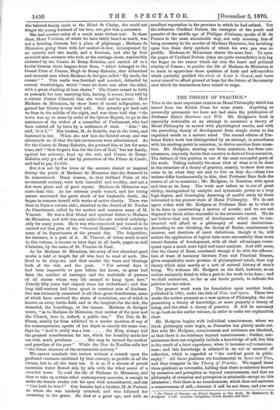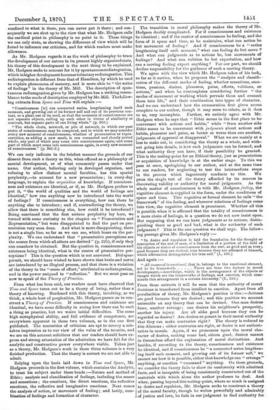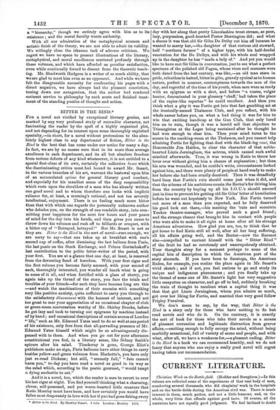THE THEORY OF PRACTICE.*
THIS is the most important treatise on Moral Philosophy which has issued from the British Press for some years. Anything so awowedly systematic we have not had since the publication of Professor Bain's Emotions and Will. Mr. Hodgson's book is especially noticeable as an attempt to construct a theory of Moral Philosophy in accord with physiological results, and with the prevailing theory of development from simple states to the organized result in a mature mind. The second edition of Pro- fessor Bain's work was distinguished by an attempt, in accordance with his starting-point in sensation, to derive emotion from sensa- tion. Mr. Hodgson, starting not from sensation, but from con- sciousness, expressly denies that emotion is derived from sensation. The defence of this position is one of the most successftrl parts of the work. Taking radically the same view of what is to be done in the structure of a theory of practice, namely, to show how men come to be what they are and to live as they do,—these two writers differ fundamentally in this, that Professor Bain finds the source of all in sensation ; Mr. Hodgson, in Emotion, with space and time as its form. The work now before us is one of great ability, distinguished by analytic and systematic power in a very high degree, and thoroughly deserving of careful study by those interested in the present state of Moral Philosophy. We do not agree either with Mr. Hodgson or Professor Bain as to what is to be done in constructing a system of morals ; and we are not disposed to think either successful in the structure reared. We do not believe that any theory of development which can be con- structed will afford us a philosophy of moral distinctions. According to our thinking, the theory of Butler, cumbersome in manner, and destitute of exact definitions, though it be, will endure the application of logical tests more successfully than more recent theories of development, with all their advantages conse- quent upon a much more rigid and exact analysis. And still more, that the theory of Kant, cumbered though it be with the affirma- tion of want of harmony hetween Pure and Practical Reason, gives unspeakably more promise of philosophical result, than any theory which aims merely at a sort of natural history of man's being. We welcome Mr. Hodgson on the field, however, as an author eminently fitted to take a part in the work to be done ; and we shall endeavour, so far as our limits permit, to indicate the position he has taken.
The present work rests for foundation upon another book, published in 1865, under the title of Time and Space. These two works the author presents as a new system of Philosophy, the one presenting a theory of knowledge, or more properly a theory of being, and the other a theory of practice. It will be necessary to go back on the earlier volume, in order to make our explanation clear.
Mr. Hodgson begins with individual consciousness, where we think philosophy must begin, as Descartes has plainly made out. But with Mr. Hodgson, consciousness and existence are identical, so that there is no existence beyond consciousness ; further, con- sciousness does not originally include a knowledge of self, but this is the result of a later experience, when it becomes self-conscious- ness; and this knowledge is attained in an act or moment of reflection, which is regarded as "the cardinal point in philo- sophy." All these positions are fundamental in Space and Time, and they reappear in the Theory of Practice. We regard these three positions as untenable, holding that there is existence known by sensation and perception as beyond consciousness, and that no philosophy of sensation and perception is attainable except on this admission ; that there is no consciousness, which does not embrace a consciousness of self,—because if self be not there, and you are • The Theory of Practice: an Ethical Enquiry in Two Books. By Shadworth H. Hodgson: 2 vole. London: Longman, Green, Reader, and Dyer.
confined to what is there, you can never put it there ; and con- sequently we are shut up to the view that what Mr. Hodgson calls the cardinal point in philosophy is no point in it. These things we can only state, as showing the difference of view which will be found to influence our criticism, and for which readers must make allowance.
As Mr. Hodgson regards it as the work of philosophy to trace the development of our nature to its present highly organized state, his theory of this development is the next thing to be explained. Mr. Hodgson seeks to account for it by spontaneous redintegration, which in higher development becomes voluntary redintegration. This redintegration is different from that of Hamilton, by which he used to explain phenomena of memory, and is more akin to "the series of feelings" in the theory of Mr. Mill. The description of spon- taneous redintegration given by Mr. Hodgson has a striking resem- blance to the mode of description employed by Mr. Mill. Thefollow- ing extracts from Space and Time will explain :-
"Consciousness [is] one connected series, lengthening itself each moment, and growing out of its former self and out of its previous con- tent, as a plant out of its seed, so that the moments of consciousness are not separate objects, calling up each other in virtue of similarity or contrast, but organic parts of one living whole." (p. 263.)
"The whole chain, network, or pile of network, to which our past states of consciousness may be compared, and to which we may consider every new moment of consciousness, whether of presentation or repre- sentation, as adding a new mesh, is one connected and closely netted whole, any part of which may come into consciousness again; and some part of which must come into consciousness again, in every new moment of consciousness." (p. 261-2.)
We can only indicate in the briefest manner the grounds of our dissent from such a theory as this, when offered as a philosophy of mental development, or of what commonly passes under that name. Our author, believing only in developed organism, and refusing to allow distinct mental faculties, has this special perplexity,—to account for a new presentation ; in every-day language, to explain the acquisition of knowledge. If conscious- ness and existence are identical, or if, as Mr. Hodgson prefers to put it, " the world of qualities and the world of feelings are identical," how can anything new be introduced into the world of feelings ? If consciousness is everything, how can there be anything else to introduce ; and if, contradicting the theory, we allow that there is something else, how could it be introduced? Being convinced that the first serious perplexity lay here, we turned with some curiosity to the chapter on " Presentation and Representation," but were disappointed to find the part on pre- sentation very soon done. And what is more disappointing, there is not a single line, so far as we can see, which bears on the per- plexity. We can understand that " presentative perceptions are the source from which all others are derived " (p. 225), if only they can somehow be obtained. But the question is, consciousness and existence being identical, what is the source of presentative per- ceptions ? This is the question which is not answered. Did space permit, we should have wished to have shown that brain and nerve are introduced by an illogical process, and that there is a violation of the theory in the "sense of effort," attributed to redintegration, and in the power assigned to " reflection." But we must pass on now to speak of the Theory of Practice.
From what has been said, our readers must have observed that Time and Space turns out to be a theory of being, rather than a theory of knowing. Burdened with this theory, involving, as we think, a whole host of perplexities, Mr. Hodgson passes on to con- struct a Theory of Practice. If consciousness and existence are identical, we have some difficulty in seeing how there can be such a thing as practice, but we waive initial difficulties. The same high metaphysical ability, and full evidence of competence, are everywhere apparent in these two volumes, as in the one first published. The necessities of criticism are apt to convey a mis- taken impression as to our view of the value of the treatise, and we are on this account solicitous that our readers should have ex- press and strong attestation of the admiration we have felt for the analytic and constructive power everywhere visible. Taken just as a theory, Mr. Hodgson's work in these three volumes is a very finished production. That the theory is correct we are not able to admit.
Relying upon the basis laid down in Time and Space, Mr. Hodgson proceeds in the first volume, which contains the Analytic, to treat his subject under these heads :—Nature and method of Ethic ; analysis and classification of feelings, including the senses and sensations ; the emotions, the direct emotions, the reflective emotions, the reflective and imaginative emotions. Next comes the analysis of action, or movement of feeling ; and lastly, com- bination of feelings and formation of character. The transition to moral philosophy makes the theory of Mr. Hodgson doubly complicated. For if consciousness and existence be identical ; and if the matter of consciousness be feeling, and the form of it space and time, as he maintains, what can action be- but movement of feeling? And if consciousness be a "series lengthening itself each moment," what can feeling do but move ? And what can judgments as to actions be, but movements of feelings? And what can volition be but expectation, and how can a moving feeling expect anything ? For our part, we should decline responsibility for the guidance of such a moving theory.
We agree with the view which Mr. Hodgson takes of his task,. so far as it carries, when he proposes the " analysis and classift- • cation of the different modes of feeling, whether sensations, emo- tions, passions, desires, pleasures, pains, efforts, volitions, or actions," and when he contemplates considering further " the modes of movement or working which pervade them and connect. them into life," and their combination into types of character.
And we can understand how the enumeration first given seems complete to our author, though it may seem to others, as it does- to us, very incomplete. Farther, we entirely agree with Mr. Hodgson when he says that " Ethic seems in the first place to be
conversant with actions and habits," while " from another side Ethic seems to be conversant with judgments about actions and
habits, pleasures and pains, as better or worse than one another,. judgments of approval or disapproval." What we are mainly at a loss to make out, in considering the theory as a whole, and with-.
out going into details, is how such judgments can be formed, and what authority they can have, if their possibility be granted. This is the testing-point for an Ethical theory, just as presentation or acquisition of knowledge is at the earlier stage. To this we pass at once, apologizing to our author, and at the same time to our readers, for neglecting to teat the intermediate steps- in the process which ingeniously conducts to this. We press the single teat of the theory afforded by its success is discovering validity or authority for moral judgments. As the whole matter of consciousness is with Mr. Hodgson feeling, the cognitive element is supplied in the form, under the conditions of space and time. This cognitive or formal element he calls "the framework" of the feeling, and wherever relations of feelings come into view, the cognitive element is prominent. 'Whether all this is possible when it is affirmed that the totality of consciousness is.
a mere chain of feelings, is a question we do not now insist upon._ But supposing that we can have judgments as to actions, distin- guishing them as good and bad, what is the authority of such judgments ? This is the one question we shall urge. The follow- ing passage gives Mr. Hodgson's reply
In desire and repulsion is laid the foundation for the thought or conception of the end of man, of a limitation of a portion of the field of his objects or states of consciousness from the rest, as good and as true: good because they are desired, true because they are affirmed of himself,. which affirmation distinguishes his true self." (I., 166.)
And again :— "All command is emotional, that is, belongs to the emotional element,.
not to its framework There are thus two factors in moral, development,—knowledge, which is the arrangement of the objects or images which are the frameworks of feelings, and emotion, which com- mands this arrangement in a certain hierarchy." (I., 256.)
From these extracts it will be seen that the authority of moral decisions is transferred from intellect to emotion. Apart from all peculiarities of theory, Mr. Hodgson's position is this:—Actions are good because they are desired ; and this position we account untenable on any theory that can be devised. One man desires fame, another revenge ; one desires his neighbour's prosperity,.
another his injury. Are all alike good because they can be- regarded as desires? Are desires so potent in their moral authority that they can make contraries right? The theory is reduced to this dilemma ; either contraries are right, or desire is not authori-
tative in morals. Again, if we pronounce upon the moral cha- racter of desires, making some bad, others good, desires cannot• in themselves afford the explanation of moral distinctions. And
besides, if according to the theory, consciousness and existence be identical, and if consciousness be " a connected series lengthen- ing itself each moment, and growing out of its former self," we cannot see how it is possible, either that knowledge can " arrange'
anything, or emotion " command " anything. On these grounds, we consider the theory fails to show its conformity with admitted facts, and is incapable of being consistently constructed out of the
materials with which alone the author professes to deal. And when, passing beyond this testing-point, where so much is assigned to desire and repulsion, Mr. Hodgson seeks to construct a theory of the moral faculty, though he writes powerfully and admirably of justice and love, he fails in our judgment to find authority for a "hierarchy," though we entirely agree with him as to its existence ; and the moral faculty wants authority.
With all our admiration of the metaphysical acumen and artistic finish of the theory, we are not able to admit its validity. We willingly close the irksome task of adverse criticism. We regret we have no space to present illustrations of the literary, metaphysical, and moral excellences scattered profusely through these volumes, and which have afforded us peculiar satisfaction, even while continually forced to dissent from the theoretic teach- ing. Mr. Shadworth Hodgson is a writer of so much ability, that we are glad to meet him even as an opponent. And while we have felt the disagreeable necessity for confronting his pages with a direct negative, we have always had the pleasant conviction, toning down our antagonism, that the author had rendered eminent service to philosophy by such acute and finished treat- ment of the standing puzzles of thought and action.




































 Previous page
Previous page